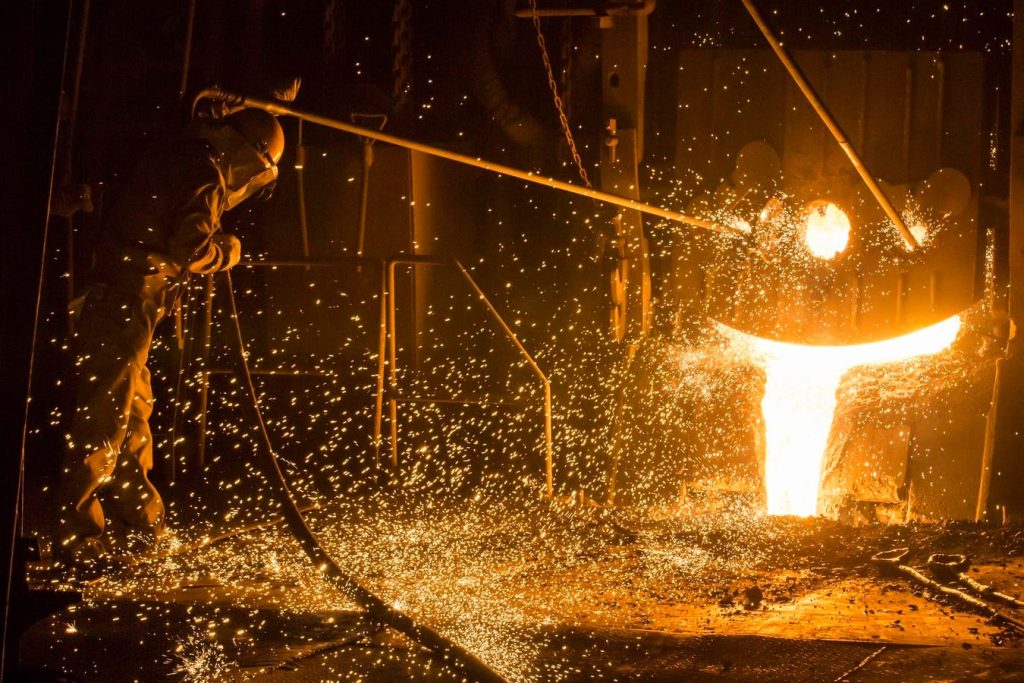Australia Forges a Path Towards Green Steel with Innovative NeoSmelt Project
In the heart of Western Australia, a groundbreaking initiative is taking shape, poised to revolutionize the steel industry and pave the way for a greener future. A consortium of Australian giants – mining behemoths BHP and Rio Tinto, energy leader Woodside Energy, and steel manufacturer BlueScope – have joined forces to explore the feasibility of establishing an electric arc steel mill powered entirely by renewable energy. Dubbed the NeoSmelt project, this ambitious endeavor aims to produce "green" steel with a significantly reduced carbon footprint, marking a radical departure from traditional coal-intensive methods.
The project holds immense promise for Australia, potentially transforming the nation into a global leader in sustainable steel production. Currently, Australia primarily exports raw iron ore, leaving the value-added processing and steelmaking to other countries, particularly in Asia. NeoSmelt, however, envisions a future where Australian iron ore is processed domestically, creating a new market for the resource and boosting the local economy. The envisioned plant, planned for a site near Perth, would utilize renewable electricity generated from solar and wind farms, eliminating the need for coal and drastically reducing greenhouse gas emissions.
The path to green steel is not without its challenges. The NeoSmelt project faces the daunting task of succeeding where previous attempts at innovative iron and steel processing in Australia have faltered. Past ventures, including BHP’s conventional blast furnace near the proposed NeoSmelt site, Rio Tinto’s groundbreaking Hismelt technology, and BHP’s hot-briquetted iron (HBI) project, all ultimately met with failure due to various factors ranging from economic viability to technical difficulties.
However, the NeoSmelt consortium remains undeterred, drawing strength from the lessons learned from past endeavors and the advancements in renewable energy technology. The partners believe that the convergence of these factors creates a unique opportunity to achieve what was previously impossible. The project has garnered substantial support from the Western Australian government, which has pledged A$75 million in infrastructure investment, reflecting the government’s commitment to fostering a sustainable future and positioning the state at the forefront of green steel production.
The NeoSmelt project stands as a testament to the power of collaboration and innovation in tackling global challenges. The consortium partners believe their combined expertise and resources, coupled with the government’s support, will enable them to overcome the hurdles that have stymied previous attempts. They view the project as a critical step towards decarbonizing the steel industry, a sector responsible for a significant portion of global greenhouse gas emissions.
The initial phase of the NeoSmelt project involves rigorous studies to assess the technical and economic feasibility of the proposed electric arc furnace powered by renewable energy. These studies are expected to conclude by March 2024, paving the way for a final investment decision in 2026. If all goes according to plan, the plant could be operational by 2028, ushering in a new era of sustainable steelmaking in Australia. The project has garnered significant attention within the industry, with many experts viewing it as a potential game-changer with the potential to revolutionize the global steel market.
The proponents of NeoSmelt emphasize the urgency of transitioning to cleaner steel production methods. The world is facing increasing pressure to reduce greenhouse gas emissions and mitigate the effects of climate change. The steel industry, a major contributor to these emissions, is under scrutiny to adopt more sustainable practices. NeoSmelt offers a viable pathway to achieving this goal, demonstrating the potential of renewable energy to transform even the most carbon-intensive industries.
The NeoSmelt consortium views the project not just as a commercial venture but as a contribution to a global effort to combat climate change. They believe that by pioneering this innovative approach to steel production, they can inspire others in the industry to follow suit and accelerate the transition to a more sustainable future. The project has the potential to create a ripple effect, driving further innovation in renewable energy and green steel technology.
The leaders of the consortium partners have expressed their strong commitment to the success of NeoSmelt. They view the project as a critical step in decarbonizing the steel industry and securing a sustainable future for the sector. They believe that Australia, with its abundant renewable energy resources and rich iron ore reserves, is uniquely positioned to lead the way in green steel production.
The NeoSmelt project signifies a bold step towards a more sustainable future for the steel industry. It represents a significant departure from traditional methods, embracing innovation and renewable energy to create a cleaner and more environmentally responsible approach to steelmaking. The project has the potential to not only transform the Australian steel industry but also inspire similar initiatives globally, accelerating the transition towards a greener future.
The success of NeoSmelt hinges on the successful integration of several key components: the efficient harnessing of renewable energy, the development of a reliable and cost-effective electric arc furnace technology, and the establishment of a robust supply chain for green steel. The consortium partners are confident that their collective expertise and resources will enable them to address these challenges and deliver a successful outcome.
The Western Australian government’s support for NeoSmelt underscores the importance of public-private partnerships in driving innovation and addressing climate change. The government’s investment in the project’s infrastructure demonstrates its commitment to fostering a sustainable future and positioning Western Australia as a leader in the global green steel market.
The NeoSmelt project embodies a paradigm shift in the steel industry, moving away from reliance on fossil fuels and embracing a cleaner, more sustainable future. It sets a precedent for other industries to follow, demonstrating the potential of innovation and collaboration to drive positive change and address global challenges. The project is a beacon of hope in the fight against climate change, offering a tangible example of how human ingenuity can be harnessed to create a more sustainable world.















